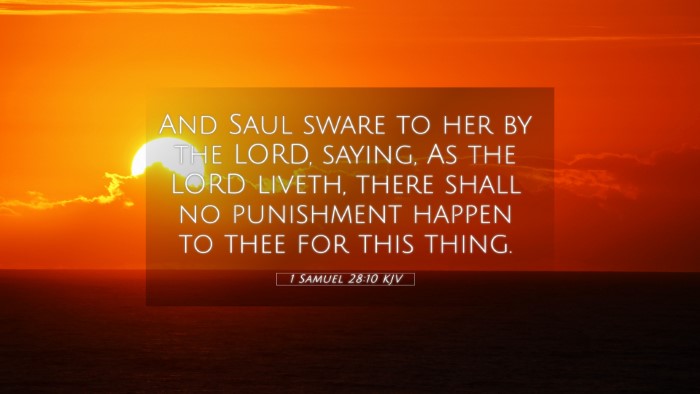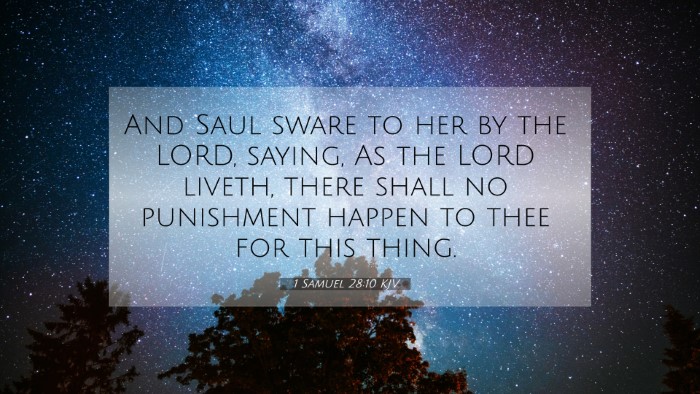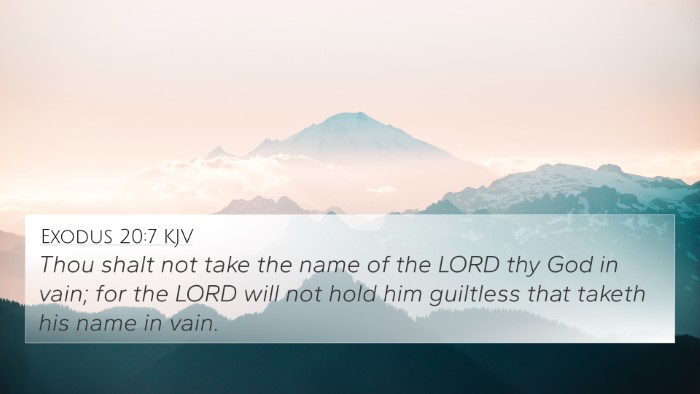Understanding 1 Samuel 28:10
"And Saul sware to her by the Lord, saying, As the Lord liveth, there shall no punishment happen to thee for this thing." (1 Samuel 28:10)
This verse captures a critical moment in the narrative of Saul's life, highlighting his desperation and moral decline. He seeks counsel from a medium, an act that contradicts the commandments of God. Below is a summarized meaning and analysis derived from public domain commentaries.
Summary of Meaning
In this passage, King Saul's decision to consult a medium represents a pivotal moment of his turning away from God’s guidance. The oath he takes before the medium indicates his desperation and willingness to placate his conscience despite divine prohibitions against seeking the dead.
Commentary Insights
- Matthew Henry's Commentary: Henry emphasizes Saul's uncharacteristic reliance on a necromancer, illustrating the depth of his despair. He notes that Saul's actions are rooted in fear rather than wisdom. Henry highlights that Saul's appeal to the Lord is contradictory as he resorts to one who is an enemy of divine law.
- Albert Barnes' Notes: Barnes explains that this act of swearing by the Lord indicates Saul's acknowledgment of God's authority while simultaneously defying it. He comments on the theological implications of consulting spirits, reinforcing that such actions are a rebellion against God.
- Adam Clarke's Commentary: Clarke elaborates on the nature of Saul's sin, stressing that his oath reflects both a fear of consequences and a misguided attempt to find solace. Clarke also points out that the medium's craft is condemned in the law, making Saul's actions all the more egregious.
Thematic Connections
1 Samuel 28:10 interacts with various theological themes found throughout Scripture. Below are related verses that provide a deeper understanding through cross-referencing:
Cross-References
- Leviticus 19:31: "Regard not them that have familiar spirits, neither seek after wizards, to be defiled by them: I am the Lord your God." - Establishing God's stance against necromancy.
- 1 Chronicles 10:13-14: "So Saul died for his transgression which he committed against the Lord, even against the word of the Lord, which he kept not..." - Connects Saul's fate to his disobedience.
- Isaiah 8:19: "And when they shall say unto you, Seek unto them that have familiar spirits, and unto wizards that peep, and that mutter..." - A warning against seeking guidance from the dead.
- Deuteronomy 18:10-12: "There shall not be found among you any one that maketh his son or his daughter to pass through the fire, or that useth divination, or an observer of times..." - Similar prohibitions on sorcery and divination.
- Galatians 5:19-20: "Now the works of the flesh are manifest, which are these; Adultery, fornication, uncleanness, lasciviousness, Idolatry, witchcraft..." - A New Testament perspective on similar sins.
- 1 Samuel 15:23: "For rebellion is as the sin of witchcraft, and stubbornness is as iniquity and idolatry..." - A direct connection linking disobedience to witchcraft.
- Job 27:8: "For what is the hope of the hypocrite, though he hath gained, when God taketh away his soul?" - Reflects on the futility of seeking knowledge apart from God.
Lessons from 1 Samuel 28:10
This verse serves as a poignant reminder about the consequences of straying from God's path. It demonstrates that turning to worldly solutions in times of crisis often leads to greater despair. The act of swearing falsely as Saul did signifies the moral deterioration one may experience when distancing oneself from divine guidance.
Practical Application
For individuals engaging in Bible study, this verse highlights the importance of understanding context through tools for Bible cross-referencing:
- Utilizing a bible concordance to explore terms and themes related to witchcraft and divine consultation.
- Employing a bible cross-reference guide to identify passages that discuss God's directives concerning mediums.
- Implementing cross-reference Bible study methods to analyze parallels with other biblical characters who experienced similar struggles.
- Engaging in comprehensive Bible cross-reference materials during sermon preparations to reinforce messages on obedience and faith.
Conclusion
1 Samuel 28:10 serves as a sobering reminder of the complexity and consequences of human choices in relation to divine authority. The insights gleaned from various commentaries and the thematic connections with other scripture provide a robust framework for understanding this verse's significance within the larger narrative of the Bible.










